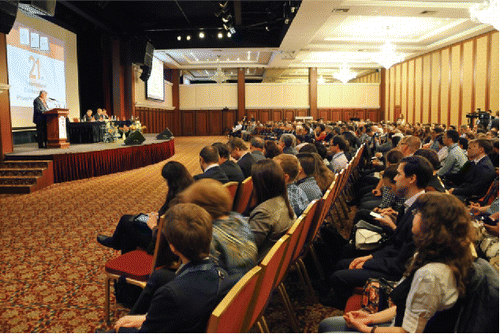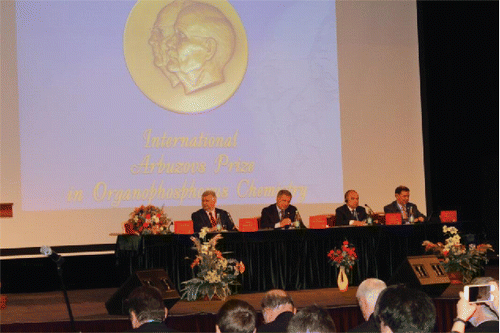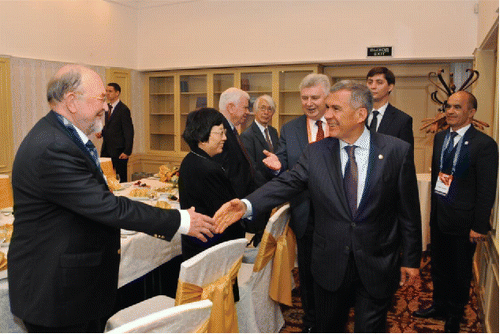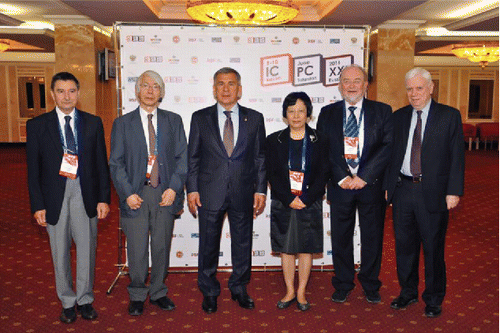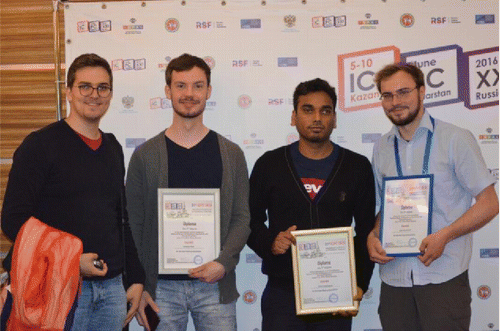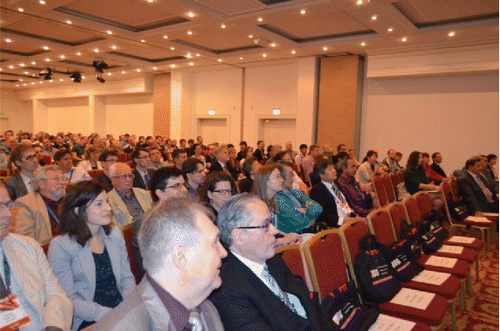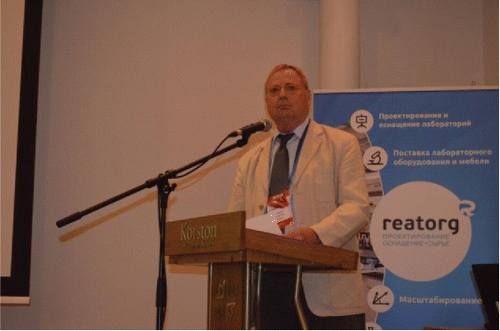It gives me great pleasure to introduce this special issue of Phosphorus, Sulfur, and Silicon and the Related Elements, which presents selected papers from the 21st International Conference on Phosphorus Chemistry (http://icpc2016.ru/) held in Kazan, Russia, from the 5th to 10th June 2016 as well as information about the awarding ceremony of the International Arbuzovs prize in Organophosphorus Chemistry-2015.
Editor-in-Chief, Professor Martin Rudd has been a great help in putting together this special issue. I am also indebted to my fellow editors, Prof. Yuliya Budnikova and Dr. Tatiana Keshner for help in collecting papers and additional information for this issue.
The International Conferences on Phosphorus Chemistry are conducted under the auspices of the International Union of Pure and Applied Chemistry in the biggest scientific centers of the world and are held, as a rule, biennially. The First Conference took place in 1964 in Germany. So, during more than fifty years of their history, these Conferences have played an important role in the formation and development of main directions of this chemistry field.
For the first time, the Conference was held in Russia, in Kazan! We consider this fact as international recognition for the important contributions of Russian chemists, including some generations of the world-famous Kazan Chemistry School, into the world science scene.
We were proud to host ICPC-2016 just in Kazan, the capital of the Republic of Tatarstan, in “a cradle of Russian organic chemistry”, in the city where the East meets the West! Well known chemical scientists with names such as Karl Klauss, Nikolay Zinin, Alexander Butlerov, Vladimir Markovnikov, Alexander Zaitzev and Flavian Flavitzki, worked in Kazan in the 19th century. Specifically, in Kazan at the beginning of the 20th century Professor Alexander Arbuzov began to create the Russian phosphorus chemistry school. Alexander Arbuzov discovered his famous reaction here that is today named as “Arbuzov-Michaelis Reaction.”
In 1997 by the Order of the President of the Republic of Tatartstan, the International Arbuzovs Prize in Organophosphorus Chemistry was established in the memory of the outstanding Russian chemists Alexander and Boris Arbuzovs. The Prize is awarded to honored chemists for significant achievements in the phosphorus chemistry field. For these years 10 world-famous scientists from Russia, United States, Poland, France, Germany, Japan, Great Britain, and Ukraine have become Arbuzovs Prize laureates. In the frame of the Opening Ceremony of ICPC-2016 the President of the Republic of Tatarstan presented the Prize for the eleventh time. The Arbuzovs Prize winner this time, Professor Yufen Zhao (China), has made a great contribution in fundamental phosphorus chemistry and the connected fields of molecular biology and medicinal chemistry.
“It's my first visit to Kazan. Kazan is a very beautiful city, but first of all I would like to express my admiration by the development of science in Tatarstan and especially by attention and kindness to scientific problems from the Tatarstan Government,” said Prof. Zhao.
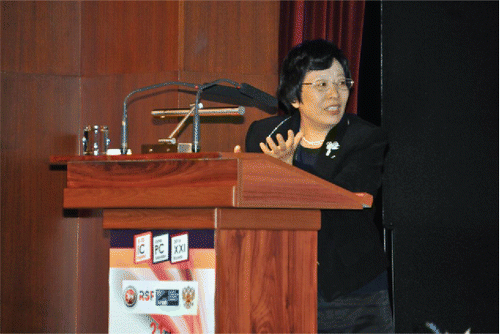
So, six Arbuzovs Prize winners - Professors François Mathey, Masaaki Yoshifuji, Irina Beletskaya, Marian Mikolajczyk, Michael Blackburn, and Yufen Zhao, delivered their plenary and keynote lectures at the Conference. Eighteen members of the ICPC Steering Committee took part at the Conference with plenary and keynote lectures too.
The Conference took place at the luxurious International Congress Centre “Korston,” located in the Kazan business center, in the vicinity of the ancient Kazan Kremlin. The opening ceremony and plenary lectures were arranged in the Korston Great Hall seating up to 1200 persons. The Congress Centre also provided some multifunctional halls for 60–370 persons where Parallel Scientific sections and School-Conference were organized: Pushkin, Tolstoy, Dostoevsky, Lermontov, and Chekhov halls.
ICPC-2016 presented an interesting scientific program centered around the following directions in phosphorus chemistry: Progress in Organophosphorus Chemistry; New Phosphorus Reagents in Organic Synthesis; Phosphorus in Coordination and Inorganic Chemistry; Frontiers of Catalytic Processes; Phosphorus in Life Sciences; Towards New Age Materials Based on Phosphorus Compounds; Phosphorus in Industry, Green Chemistry and Sustainable Development.
As well an important part of the Conference scientific program became School-Conference “Rational Design of Phosphorus Substances with Desired Properties.” All of these varied directions were put into context with one lecture of the new International Arbuzovs Prize winner, 12 plenary and 41 keynote lectures, 99 oral presentations, and 180 posters introduced at the Conference.
Prof. Yufen Zhao opened the scientific program with her lecture “Phosphorous Chemistry and Evolution of Biological Molecules”; other inspiring plenary reports were made by Prof. Andrey Karasik (Russia) “Cyclic Aminomethylphosphines as Ligands. Balancing between Rational Design and Unpredicted Findings,” Prof. Christian Müller (Germany) “Recent Developments in the Chemistry of Low-Coordinate Phosphorus Heterocycles,” Prof. Anne-Marie Caminade (France) “Cyclotriphosphazene, an Old Compound Applied to the Synthesis of Smart Dendrimers with Tailored Properties,” Prof. G. Michael Blackburn (UK) “Life is about Making and Breaking Phosphate Bonds”, Prof. György Keglevich (Hungary) “Milestones in Microwave-Assisted Organophosphorus Chemistry,” Prof. Irina Beletskaya (Russia) “Catalysis by Transition Metal Complexes in Phosphorus Chemistry,” Prof. Marvin H. Caruthers (USA) “Oligonucleotide Synthesis Interfaced with Molecular Biology and Nanotechnology”, Prof. Francois Mathey (Singapore) “Activation of A-H Bonds by Electrophilic Terminal Phosphinidene Complexes (A = O, P, C, etc.),” Prof. E. Hey-Hawkins (Germany) “Multifaceted Chemistry with Phosphorus-rich Oligophosphanide Anions”, Prof. Alexander Gabibov (Russia) “Modern Pharmacology: Magic Bullet & Combinatorial Approaches. Mechanisms of Antigen Degradation,” Prof. Masaya Sawamura (Japan) “Development of New Solid-immobilized Phosphines for Solving Problems in Organic Synthesis,” and Prof. Koop Lammertsma (the Netherlands) “P-Chemistry – from Reagents, to Ligands, to P4-activation, to Catalysis.”
Attending were 347 participants from 26 countries: China, Germany, France, Japan, United States, Poland, Hungary, Singapore, Sweden, Iran, United Kingdom, Austria, Switzerland, Mexico, the Netherlands, Canada, Ireland, Belgium, the Czech Republic, Finland, Kazakhstan, Italy, Spain, India, Vietnam, and Russia, who had a wonderful time hearing many interesting reports and seeing Kazan with its rich history.
It's understood that holding such a prominent forum would not be possible without the active support of many organizations. First of all, on behalf of all Kazan chemists I would like to express my gratitude to the Government of the Republic of Tatarstan and personally to Rustam Minnikhanov, the President of the Republic of Tatarstan and patron of ICPC-2016 for his kind help in the organization of this Conference. I am equally appreciative for the support of the Russian Scientific Foundation and the Russian Foundation for Basic Research. I am grateful to all my colleagues, members of the Local Organizing Committee, especially to Prof. Andrey Karasik for their good organizing work. Lastly, I am especially thankful to all members of the ICPC Steering Committee for their decision to host ICPC-2016 in Kazan.

